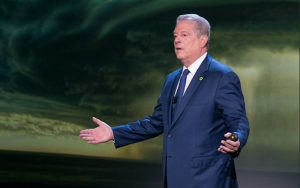Metro Canada: Al Gore on three key climate change issues facing Canadians
 By Richard Crouse – Metro Canada
By Richard Crouse – Metro Canada
A decade after the glorified PowerPoint presentation An Inconvenient Truth won the Best Documentary Oscar and opened a lot of eyes to the effects of climate change comes a follow-up, An Inconvenient Sequel: Truth To Power. The film takes a global look at climate change but we asked the film’s star, former Vice President Al Gore, to weigh in on three key issues facing Canadians. This interview has been edited for length.
Metro: What should Canadians know about the threats of tsunamis on the Great Lakes?
“Canada has more lakes than the rest of the entire world put together and the amount of fresh water here is just incredible,” he said. “Our two countries must recognize the unique and important value of the Great Lakes.
“The emergence of wind storms, winds of unusual speed and ferocity, is due to the extra heat energy being trapped in the atmosphere by man made global warming pollution. We now trap as much heat in the earth’s system every day, extra heat, as would be released by 400,000 Hiroshima class atomic bombs going off every day. It’s a big planet but that is a lot of energy and with the melting of the ice cover on lakes, not least the Great Lakes, the wind picks up speed because of that too.”
Metro: Pipelines seem inevitable but what should environmentalists do, as these projects go ahead, there’s as little negative environmental impact as possible?
“I personally would like to see a much quicker transition away from all fossil fuels,” Gore said. “I’m not happy about all these pipelines in my own country as well but I recognize we’re in a transition period. Getting a price on carbon, getting a global policy in place, those are important steps now. The cost of renewable energy, not only for powering electric generating processes but also to replace internal combustion engines with EVs (Electric Vehicles), is being introduced by every car manufacturer in the world. That gives us a chance to speed up the transition in the years ahead.”
Metro: What can be done to make sure Canada’s Indigenous groups are more involved in key environmental decisions?
“As an environmentalist I will say it is striking how many environmental struggles are actually now being led by indigenous peoples. We have seen the Lummi Tribe win a huge victory to reduce carbon emissions and coal exports and the Standing Rock Sioux taught the entire world a lesson with their powerful teaching, ‘Water is life.’ There are many other examples I could cite but I will just sum up by saying there is a lot of wisdom that can be found in tribes and in the traditions and teachings of indigenous peoples that all of us would do well to heed.”
An Inconvenient Sequel: Truth To Power uses potent images, like streets melting in oppressive heat and anticipatory mass graves dug in Asia in preparation of deaths from extreme weather, to urge citizens to “Fight Like Your World Depends On It.” In our interview he gave us this call to arms of sorts.
“We’ve built a civilization optimized for the climate conditions that led to the flourishing of humanity,” he said, “and now we are destroying those conditions. We can bring it back. We can stop he worst of these consequences but we have to act.”
SIDEBAR:
An Inconvenient Sequel: Truth To Power contains footage shot all over the world. In one final question we asked Al Gore and Jeff Skoll, philanthropist and producer of An Inconvenient Truth and its sequel, how they offset the carbon footprint they create jet setting around the world.
Gore: “Jeff’s company and my organization, we do a complete offset. I planted 16, 000 trees on my farm last year but we do other offsets in addition to that.”
Skoll: “All the organizations, myself and the films do something called negative offsetting. We fund these things that will take coal plants offline and put on solar plants and things like that. For every mile we fly, for every trip we take, we actually double offset. We don’t just offset the amount we fly, we do a doubling. If everybody did that we’d have no more climate issues.”
